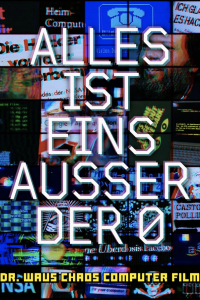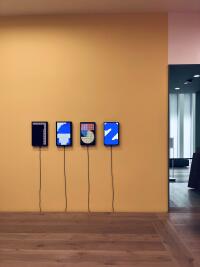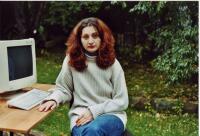Digital Pioneers: Maeck | Lehni | Boudry


With Wau Holland and other members of the Chaos Computer Club (CCC) / Camera: Hervé Dieu / Ton: Tino Selengia / Cut: Andreas Grützner / Sounddesign: Nico Berthold / Music: Alexander Hacke / Produced by Interzone Pictures / Distribution Neue Visionen, Berlin
Courtesy Klaus Maeck
This experimental documentary draws the portrait of computer pioneers and hackers in Europe. At the beginning of the hacker culture was its first international digital civil rights activist: Herwart Holland-Moritz alias Wau Holland. In 1981, he and a handful of fellow campaigners founded the Chaos Computer Club. The CCC became world-famous for its spectacular hacks and later for its involvement with the secret services. It believed that machines and technology would enable a practice of unhindered social exchange. It saw digitalisation as an essential tool for creating social cohesion. Today, some 40 years after its creation, the CCC’s visions of what computer technology may seem utopic but remain important. Its creative scope was seen as infinite, profit wasn’t a goal but data privacy was already a concern. This film serves as a ‘punk portrait’ of idealistic computer pioneers and tells a large chunk of contemporary history along the way of the Cold War, the fall of the Berlin Wall, hippies to the first outlines of the emerging information society.
Further reading:
Podcast: Conversation between artist Klaus Maeck and Tanja Schwerdorf, moderated by Cathérine Hug
ALLES IST EINS. AUSSER DER 0. [German]
Tracks - Spezial Hacker: Klaus Maeck / Ubermorgen / Keycaps Artisans | ARTE [German]

Jürg Lehni, *1978
Four Transitions, 2020
15 flip-dot modules (21×35 pixels), 2 LCD modules (52×72 pixels), 6 LED RGB modules (32×48 pixels), 1 24” TFT display module (1200×1920 pixels), customized controllers, software and backlighting, 4 microcomputers, internet connection
Acquired 2024, Time-Based Media Collection, Kunsthaus Zürich
Originally developed for the HeK Collection (House of Electronic Arts Basel), as a donation from the Christoph Merian Foundation, and developed with Alex Rich, Urs Lehni, Arno Schlipf and Bruno Thurnherr.
'Four Transitions' is a work about the passing of time, consisting of four custom-made displays, each representing a technological era: LCD (liquid-crystal display), LED (light-emitting diode) and TFT (thin-film transistor). All four technologies are based on both physical and electronical principles, the oldest Flip Dots on the far left being obviously the most ‘mechanical’. Each screen takes one minute to build up the actual digit of the current time. The work thus functions as an unconventional clock, linked in real time through the internet. In the past, this kind of screens were omnipresent in public spaces to display regularly changing and updated information. It is only with their disappearance and shift to the museum context, however, that their unique character and visual qualities become visible. This work celebrates the aesthetic singularities of each of these technologies and reminds us how quickly they could become obsolete.

Jürg Lehni, *1978
Apple Talk, 2002/2007
Macintosh computers, microphones, text-to-speech and speech recognition software
Courtesy Jürg Lehni
A first version was created under the title Analog Information in 2002 by Jürg Lehni as part of a project at ECAL with Franz Hoffman, Pierre Terrier and Jerome Rigaud. A completely new version was created in 2007 as Apple Talk for the show Man-[in the]-Machine at ZKM, Karlsruhe / A first version was created under the title Analog Information in 2002 by Jürg Lehni as part of a project at ECAL with Franz Hoffman, Pierre Terrier and Jerome Rigaud. A completely new version was created in 2007 as Apple Talk for the show Man-[in the]-Machine at the ZKM, Karlsruhe.
The installation consists of computers connected to each other only by sound, through loudspeakers and microphones, and ‘speaking’ to each other. One of the computers starts by reading out a sentence from a list provided by the artist, using Macintosh Text-To-Speech synthesis. The other translates the spoken words back into written form using the software Phillips iListen, the words appearing one by one on the monitor. This text is then read out again by the first computer now listening and transcribing. The process is comparable to the ‘telephone game’, where messages were whispered from one person to the next, the meaning constantly transforming in the never-ending process of misunder-standing.
The daily use of speech suggests that we communicate because we want to understand each other. However, misunderstandings constantly ensue. This is where Apple Talk comes in: it sees an aesthetic, Dadaist-like strength in the deviation of language production. The mistakes that occur are often unpredictable, without any apparent logic, and sometimes unintentionally funny.

Pauline Boudry, *1972
Brigitta Kuster, *1970
Renate Lorenz, *1963
Copy me – i want to travel, Germany and Bulgaria, 2004
Documentary, color, audio, duration: 68'
Camera, sound, editing: Brigitta Kuster, Renate Lorenz / Music: Linda Wölfel, Pauline Boudry / Editing: Kathrin Brinkmann / Production: Renate Lorenz medienproduktion & ZDF / arte
Courtesy Pauline Boudry und Renate Lorenz
The artists’ documentary 'Copy me – i want to travel' reconstructs fragments of Bulgarian history that the general historiography has wrongly ignored. With interviews of people who worked for the computer industry and focus on Pravetz II, the Bulgarian copy of the American Apple II. In the 1980s, this Western product was dismantled and reassembled there as the Eastern product Pravetz. During communist times the copy was supposed to be a successful mass product that would outsmart the West. In this production line women took on a particular role. After 1989 in the transition from Communism to Capitalism, this type of computers was also used to produce some of history’s first viruses that spread worldwide.
In this film three female filmmakers and three female computer specialists embark together on a research trip including encounters with Plamen Vachkov, former managing director of the Pravetz factory, Maria Petrova who organized protests for unpaid wages, and Vesselin Bontchev, hunter of the notorious virus programmer Dark Avenger.